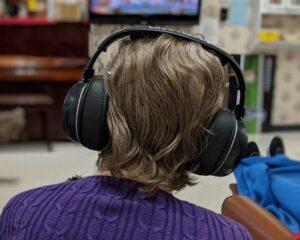As we age, it can get increasingly difficult to hold a physical book and turn its pages. However, the love of reading and listening to a good story often persists.
For grandparents and other older loved ones, digital books could (re)open a huge world of adventure.
Here’s how to help someone embark on an e-adventure with audiobooks and e-books for seniors.
First, the books:

Through the Whatcom County Library System or the Bellingham Public Library, readers have access to the Washington Anytime Library, which contains thousands of e-books and audiobooks. Books can be accessed on the web or via the Libby app for smartphones and tablets. Books checked out through Libby also can be sent to a Kindle or other e-reader for easy access.
Of course, e-books purchased from Amazon, Barnes & Noble and other retailers can be read on e-readers as well. If you have a loved one who lives here at CHCC in Lynden, you also can send e-books to their devices from the comfort of home.
For e-books, Project Gutenberg digitizes and makes available, for free, thousands of books in the public domain, including “A Room with a View,” by E.M. Forster, “Middlemarch,” by George Eliot, “Little Women,” by Louisa May Alcott, and “Moby Dick,” by Herman Melville.
A great free source of audiobooks is LibriVox, which uses volunteers to read books that are in the public domain. Paid sources of audiobooks include audiobooks.com and audible.com.
Next, the devices:
For e-books, the Amazon Kindle is a popular choice. Other popular e-book companies include Barnes & Noble, maker of the Nook, and Kobo, which produces various e-readers and is popular with independent bookstores. The Kobo Forma, with its larger screen, is generally highly rated for seniors. The Kobo Nia has a smaller screen but features built-in borrowing from the public library via OverDrive, the service that powers the Libby app. The paper-like screens of these dedicated e-readers tend to make for a more pleasant reading experience overall.

However, if you don’t want to buy a new device and already have a tablet lying around, the Apple iPad and Amazon Fire make decent e-readers. A smartphone can work for e-books, too, but the screen likely will be too small for older eyes. If you have a laptop, apps such as Aquile Reader (for Windows) are decent options, even interfacing directly with Gutenberg and other online sources for easy access to free books right through the app.
For audiobooks, any smartphone or tablet will do, using apps such as Libby or Kindle. However, one option that is particularly easy for seniors to use is the Homer Player, an app geared toward the elderly and visually impaired with clear buttons that are easy to read and press. The app also can be used to create a dedicated audiobook player that is simple for older people to operate.
Here at Christian Health Care Center in Lynden, our therapeutic recreation team makes use of many digital tools — including e-books, iPads and digital audio players — to improve the lives of those who live and receive care here. Please feel free to reach out to our t-rec team at 360-354-4434 if you have any questions about the benefits of e-readers.
